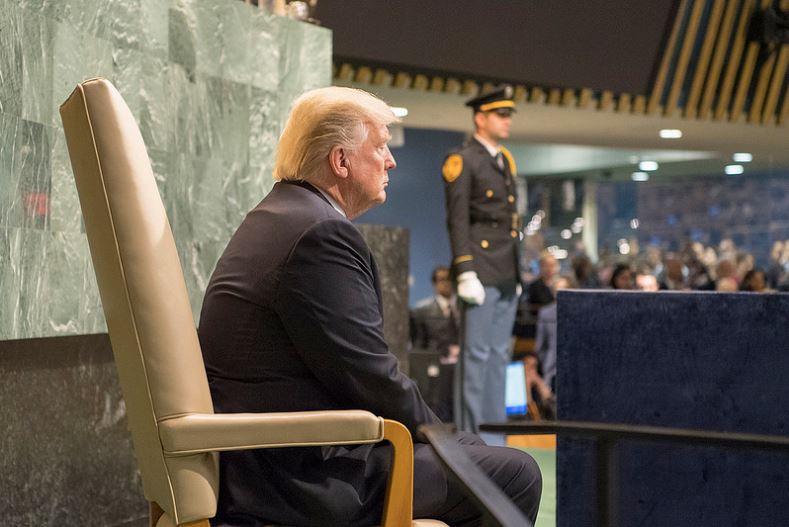 President Trump waits to address the UN General Assembly - Tuesday, Sept. 19th
President Trump waits to address the UN General Assembly - Tuesday, Sept. 19th
The North Korea Problem may be Unsolvable Without the Iran Deal
In his first appearance in front of the UN, President Donald Trump delivered a 40-minute speech that was designed to project a new image of America to an international audience. By doubling down on the threat of military action against North Korea and simultaneously decrying the Iran Nuclear Deal, the president implied to an international audience that American promises cannot be trusted.
North Korea, Validated
One of the most controversial moments from President Trump’s Tuesday address to the United Nations General Assembly came when he proclaimed that if threatened, the US would have “no choice but to totally destroy North Korea.” This isn’t the first time that the president, or members of his administration, have touted the idea of military action, but it is the first time that such action has been laid out in an official speech, presumably one that went through several drafts before arriving in its final form.
While Trump has previously made inflammatory comments on Twitter or off-the-cuff remarks during press conferences – such as his “fire and fury” comment during a press conference in early August – an official pronouncement in front of the UN General Assembly carries more weight. Following the “fire and fury” comment, the president’s staff immediately clarified that the comment was improvised, but as of yet there is no indication that his remarks at the UN were anything but planned and intentional.
President Trump’s hostile comments only confirm the narrative that the Kim regime works hard to perpetuate: the US is out to get North Korea. By explicitly threatening the rogue state, Trump has given further fodder to the Kim regime, which uses the threat from the United States to justify the oppressive practices.
The people of North Korea appear to be stuck between a rock and a hard place. Although strict censorship likely prevents them from reading the speech in full, they would find little there to give them hope. Although the president made a point of directly addressing the people of Iran and Venezuela, he made no such distinction with his threat against North Korea. There was no indication that total destruction would spare the 25 million people oppressed under the Kim regime.
Non-Military Options
The president concluded the section of his speech on North Korea by urging the regime to realize that “denuclearization is its only acceptable future.” However, the likelihood of denuclearization talks going forward is slim. In order for denuclearization to be a credible option for the North Korean regime, they need to see America as a credible negotiating partner, and President Trump’s statements on the Iran Nuclear Deal suggest the opposite.
Trump called the deal “an embarrassment to the United States” and implied that the US may soon pull out of the deal. The president’s unwillingness to uphold the Iran Deal is a huge blow to US credibility during future negotiations. His statements on the Iran Deal signal to foreign countries that if they make a deal with the US during one administration, that deal is not necessarily going to be respected four years down the line. A country looking to ensure its own survival, such as North Korea, will not see the US as a guarantor of stability or credibility. This lack of credibility all but takes denuclearization off the table.
If the US wants to position itself to combat the international problems of the 21st century, it needs to portray itself as a reliable partner. To do that, the administration needs to take advantage of international stages like the UN to affirm key deals – such as the Iran Deal and its commitment to NATO – and it needs to use rhetoric that makes other countries excited to work with the US, not wary. It’s not unreasonable for the Trump Administration to put America’s interests first when it comes to foreign policy. However, publicly reneging on international deals reflects poorly on the US, and in the long term it makes it less likely that the US will be able to achieve its foreign policy goals.





